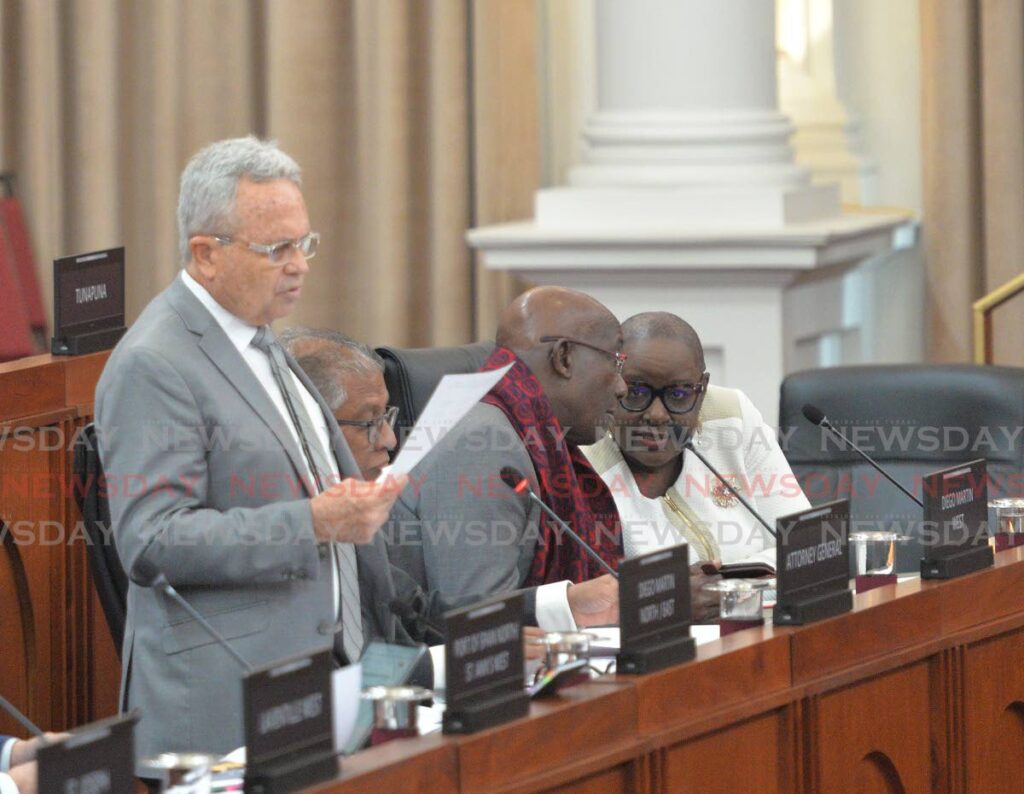Imbert: Procurement Bill changes will not ‘water down’ process

FINANCE Minister Colm Imbert is reassuring the public that amendments to the Public Procurement and Disposal of Public Property (Amendment) Act will not “water down” the process or bring calamity. Instead, he said, it will remedy defects, and bring certainty to small enterprises among other things.
Imbert was speaking during an extraordinary sitting of Parliament on Wednesday afternoon, during which the Public Procurement and Disposal of Public Property (Amendment and Validation) Bill, 2023 was debated.
UNC activist Ravi Balgobin Maharaj – who attended in the public viewing gallery – recently challenged the drafting of the original bill as he wanted the courts to determine if procurement order for the recent Caricom heads of government meeting was legal.
Finance Minister Colm Imbert later accepted there was a need to amend the act because it did not allow for unforeseen circumstances. He had also said the summit costed $9 million to host.
The Prime Minister also recently addressed this, saying the current procurement arrangement could not be allowed to stand because the Government would not be able to function.
He said the act’s requirements did not distinguish between buying trite items such as doubles and toilet paper and big items such as funding a highway.
The Opposition has since indicated its disapproval of the proposed amendments, with Opposition Leader Kamla Persad-Bissessar saying: “They want to come on Wednesday to further water down – and I would not say ‘water down’...What they are coming to do on Wednesday is put the last nail in the coffin of the public procurement law and to do the last rites and bury the law.”
On Wednesday, Imbert said he would focus on fixing a “drafting error” within the bill, as well as the modification of the method by which orders and regulations are made. He planned to make it so that goods and services costing less than $1 million would be exempted from the procurement requirement under the act but still subject to regulation.
The fixes, he said, are “not complicated.”
He said there appeared to be misconceptions of the act, which he sought to clarify.
“There is a view by those who know better and (by those who) don’t know better.”
He said the amendments would neither “water down” nor “erode” the objective of the act.
“If one looks all over the world, one will discover that exemptions are part and parcel of all modern procurement laws all over the world.”
On the introduction of a threshold, he said, “It will bring certainty to the vast amount (sic) of small and micro enterprises in this country that have been left out of the procurement (process) for one reason for the other.”
He said the government was merely “remedying the defects” of the bill.
He also said, under the current regulations, if government wished to procure something needed for routine operations such as a photocopying machine at an office, it would take up to three and a half months.
The amendments, he said, will shorten the wait time for some.
However, he noted that terms such as emergencies, matters of public interest and cost are subjective. For instance, he said, a court may not consider needing paper for a photocopying machine as an emergency.
But he insisted the changes would not create a “carte blanche, free for all” approach and reiterated that there would still be rules and regulations.
On the change to negative resolution, as opposed to affirmative, for exemption orders, Imbert said without this, the country’s development would be rendered moot.
“If we as a government do not faithfully adhere to the requirement that we ensure that things work in this country as best as they can, then we don’t deserve to be in government.”
In discussing the Caricom summit, he said anyone who has had to organise an international event understood that things could change quickly and sometimes, at the last minute.
For instance, he said, several international leaders only confirmed their attendance days before the event as they had “very busy schedules.”
He referred to Caricom’s current discussions on the procurement process for the region which “many countries” have already shown support for.
A 2017 Caricom procurement document says contracts for goods and services under $US150,000 may be exempted from procurement regulations.
As for works, contracts costing $US3 million for more-developed countries and US$4 million for less-developed countries can be exempted.
For a combination of goods and services, the cap is set at US$150,000.
There are also exemptions for works of art, cultural performances, revenue rental, legal representation, national security, utilities, among other things.
Imbert also used Australia, Aruba, Canada, the US and the EU as examples when speaking about the threshold.
He said calling a sitting of Parliament to fix such crucial matters was what any sensible country and government would do.

Comments
"Imbert: Procurement Bill changes will not ‘water down’ process"